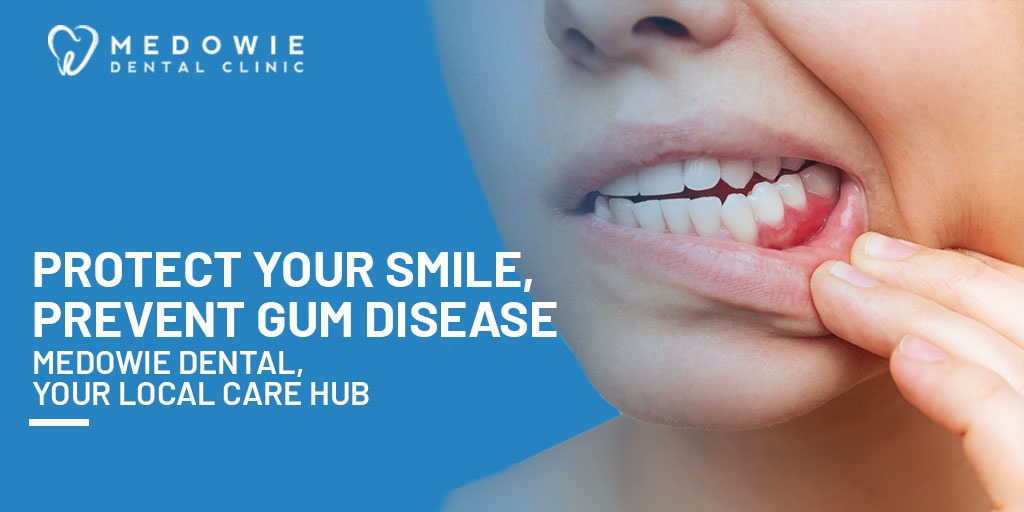Gum disease, also known as periodontal disease, is a progressive infection that can range from simple gum inflammation to a severe condition leading to tooth loss. It’s often called a “silent disease” because it can advance painlessly, making early detection crucial.
At Medowie Dental, we believe that understanding the warning signs and personal risk factors is the first and most important step toward protecting your smile. This guide covers the key symptoms to look out for and the hidden factors that might be putting you at risk.
The Early Warning Signs (What to Look For)
Recognizing these symptoms is your first line of defense. Don’t dismiss them as normal; they are your body’s way of telling you something is wrong.
1. Bleeding Gums: The First Red Flag
This is the most common and often the earliest sign of gingivitis, the mildest form of gum disease. If you notice a pink tinge on your toothbrush or blood in the sink after flossing, it’s a clear sign that your gums are inflamed and irritated due to a buildup of plaque and bacteria. Healthy gums should not bleed.
2. Red, Swollen, or Tender Gums
Take a moment to look at your gums in the mirror. Do they appear red, puffy, or swollen? Do they feel tender to the touch? Healthy gums should be firm and a pale pink color. This inflammation is a direct response from your immune system fighting off bacteria along the gumline.
3. Persistent Bad Breath or a Bad Taste
While temporary bad breath is normal, a persistent, foul odor or a metallic taste that lingers is a significant warning sign. The bacteria responsible for gum disease release foul-smelling gases as they break down tissue in your mouth. If you’re constantly reaching for mints or mouthwash, it might be time to address the root cause.
4. Receding Gums and Increased Tooth Sensitivity
As gum disease progresses, the gum tissue can begin to pull away from your teeth, a process known as gum recession. This makes your teeth look “longer” and exposes the sensitive tooth roots, leading to increased sensitivity to hot and cold temperatures.
5. Changes in Your Bite or Loose Teeth
This is a sign of advanced gum disease (periodontitis). As the infection destroys the supporting bone and tissue, your teeth may become loose or shift their position. You might notice new gaps forming between teeth or a change in how your teeth fit together when you bite. This is a critical sign that requires immediate dental intervention to prevent tooth loss.
Beyond Bleeding: 7 Hidden Risk Factors (Are You at Risk?)
While poor oral hygiene is a primary cause, many people are at a higher risk of gum disease due to factors beyond their daily brushing and flossing habits. Consider these hidden risk factors.
1. Smoking and Tobacco Use
Smoking is a leading cause of severe gum disease. Nicotine restricts blood flow to your gums, masking early symptoms like bleeding and impairing your body’s ability to heal and fight off infection.
2. Diabetes
The relationship between diabetes and gum disease is a two-way street. Individuals with poorly controlled blood sugar are more susceptible to infections, and conversely, gum disease can make it harder to manage blood sugar levels.
3. Hormonal Changes
Fluctuations in hormones, especially during puberty, pregnancy, and menopause, can make gums more sensitive and prone to inflammation. For expectant mothers, “pregnancy gingivitis” is a common concern that requires proactive dental care.
4. Genetics and Family History
Unfortunately, a predisposition to gum disease can be inherited. If your parents or siblings have a history of periodontitis, you may be at a higher risk, even with great oral hygiene.
5. Stress
Chronic stress can weaken your immune system, making it more difficult to fight off the bacteria that cause gum disease. Stress can also lead to habits like teeth grinding (bruxism), which can damage teeth and supporting tissues.
6. Certain Medications
Some medications, including certain antidepressants, heart medications, and oral contraceptives, can cause dry mouth. A lack of saliva can increase your risk of gum disease by reducing your mouth’s ability to naturally wash away plaque.
7. Poor Nutrition
A diet lacking in essential nutrients, particularly Vitamin C, can compromise your immune system and your body’s ability to maintain healthy gum tissue.
Don’t Wait: Take Action to Protect Your Smile
Recognizing the signs and understanding your personal risk factors are crucial for early intervention. If you live in Ferodale, Fullerton Cove, Salt Ash, Williamtown, or anywhere around Medowie and have noticed any of these symptoms or risk factors, it’s vital to book an appointment with a dental professional.
Our compassionate team at Medowie Dental is here to provide a thorough oral health assessment, discuss your specific needs, and create a personalized plan to keep your gums healthy. Don’t wait for a problem to worsen—be proactive about your gum health today.
